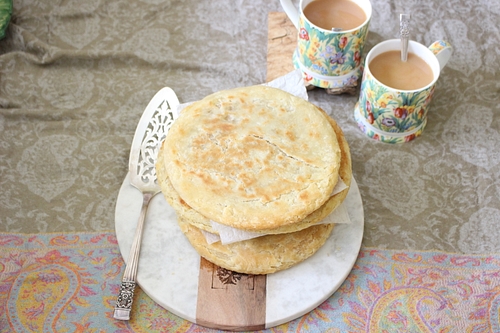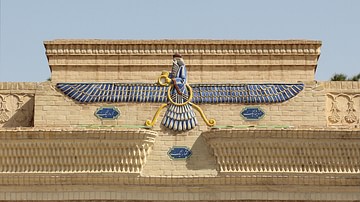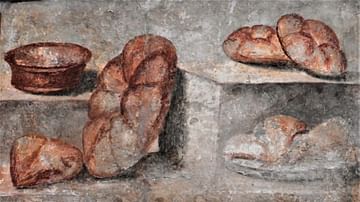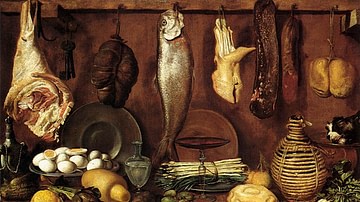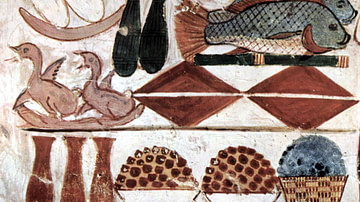In this exclusive interview, Niloufer Mavalvala, author of The Art of Parsi Cooking: Reviving an Ancient Cuisine, speaks to James Blake Wiener of Ancient History Encyclopedia (AHE) once again about the joys of Parsi cuisine and her new title: The World of Parsi Cooking: Food Across Borders.
JBW: Niloufer Mavalvala, thanks for speaking with me once more about the richness of Parsi food culture and its interesting history! You have continued your journey of exploring Parsi culinary delights in The World of Parsi Cooking: Food Across Borders, which is due out on August 19, 2019 CE. Why did you decide to continue your research and publish yet another book on Parsi cuisine?
NM: There are several reasons cookbooks are created. This one is one for the records. It is time for this great cuisine to be shared with the world, and what better than sharing a family's treasure trove of recipes? Mine are tried, tested, and praised. I have written this book with the hope that it will be timeless and used in perpetuity. Created with stunning colourful pictures, it is a chance to promote Parsi cuisine and entice not only our own children and grandchildren but also an open invitation to anyone interested in food and food history.
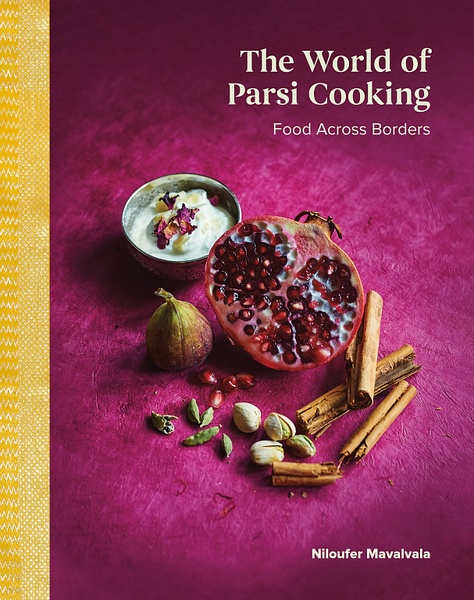
While each recipe has ancient roots, gradual changes and adaptations have been included, while ensuring the authentic flavours are bold and maintained. With the importance of preserving what continues to be a core part of our very existence, I like to think of it as almost an anthology, a part of our beautiful culture and heritage. I have had a strong desire to share Parsi cooking on a world platform for decades, and I am delighted to have the chance to do so.
JBW: Niloufer, you believe that Parsi cooking, in essence, is about “fresh and simple ingredients and an added emphasis on healthy spices.” Could you elaborate further, stating why you believe this is true, and how this differentiates Parsi cuisine from other cuisines?
NM: Yes, Parsi cooking is really all about fresh and simple ingredients with an emphasis on healthy spices. With ginger, garlic, turmeric, cinnamon, cloves, and onions being the very base of our recipes, these incredibly healthy spices and roots provide the nourishment required in each meal. Eating seasonally sustainable food is how we grew up and how most Parsi families cook and eat especially on the Indian subcontinent. Thus, our food predates by centuries the current food trends of organic and local eating, so fashionable in the Western culinary world today!
In my opinion, Parsi cuisine is differentiated from other cuisines with its enormous flavours in spite of its simplicity. The inclusion and perfectly balanced addition of tikkhu khattu mitthu (spicy-sour-sweet) is the key between mediocrity and excellence in any Parsi dish.
JBW: Parsi cuisine seems to be the amalgamation of many differing traditions. How does The World of Parsi Cooking explore the history of the Parsi people across time and space?
NM: Parsi cooking is neither authentically Indian nor Persian, but a delicately refined fusion of the two. "Deep," "rich," and "ancient" are what best describe the world of Parsi cooking. It has been over 2,500 years since this cuisine was born, and it has journeyed across the borders of ancient Persia, through Gujarat, Maharashtra, and many other regions of India, into Pakistan, Bangladesh, and most recently into the UK, Australasia, North America, and now the world at large.
Persian influences in Parsi food are clearly marked by our love for rice, meat, and eggs. While we enjoy a variety of vegetables topped with egg, called the per edu, the Persians make something similar and call it kuku. The coconut curry and chillies are part of the Indian influence as are the use of vinegar and spices. The inclusion of dry fruit and nuts gives sweetness to our food. A distinct and unique flavour of Parsi cooking is a result of the unique history that the Parsi-Zoroastrian community continues to celebrate.
It took moving to Canada and being away from my familiar surroundings to feel an innate gratitude and sense of pride for being part of a community with such a rich cultural heritage, filled with traditions, which go back several millennia.
JBW: When researching and writing your new title, did you learn any new facts about the Parsis or Parsi cuisine that you were previously unaware of? If so, what are they, and how did you integrate this new knowledge into your title?
NM: Yes, interesting facts always result from the research. Firstly, the word vasanu is incorrectly used to mean sua pak - a dill-seed spread. Used in the right context vasanu refers to dry fruits, nuts, and seeds, a collection of ingredients used to make various paks - caramelised spreads.
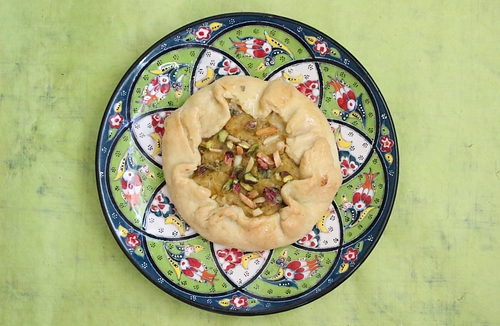
Secondly, research and new facts lead me to create a more practical version of the daar ni pori, a very sweet, lentil-filled crust that dates back centuries. My findings show that 90 per cent of earlier cooks did not prepare this hard-to-make crust while wasting most of it because the proportion of lentil to crust is too small. Renaming it daar ni potli - potli means "money bag" or "pouch" - this sweet lentil crostata is simpler to prepare and has a generous share of lentil filling in a tastier crust.
JBW: Which are your favorite recipes in The World of Parsi Cooking? Are these favorites relatively easy and inexpensive to prepare?
NM: I would say kheema sali per edu, which is ground-minced mutton or beef cooked with spices, and served with crisp potato matchsticks and a fried egg on top. Often served with a tomato ginger lime jam, it can be enjoyed with fresh rotli or in a bun much like a sloppy joe!
My love for the many varieties of the mango - the "king of fruits" - and the numerous ways of including it in our food both in the ripe and unripe state are further personal favourites. We prepare the mango in all possible forms: cooked and pickled; with and without the skin; juiced and in a lassi; creamy mango ice creams and kulfis. Besides the mango recipes, I also enjoy it perfectly ripened served fresh.
Parsi food is not only inexpensive to prepare, but it has very little waste; besides the mango or the lemon, even vegetables like the humble white bottle gourd has a recipe for making cutlets from its skin!
JBW: Who would you say who has had the greatest influences on your career path with regard to cooking and food history?
NM: My dad was the greatest influence in my life, urging me to always give everything a try. To live life to the fullest and reaching for the stars. Sadly, he passed away 28 years ago, while he was rather young. The desire to follow his example has become even stronger now.
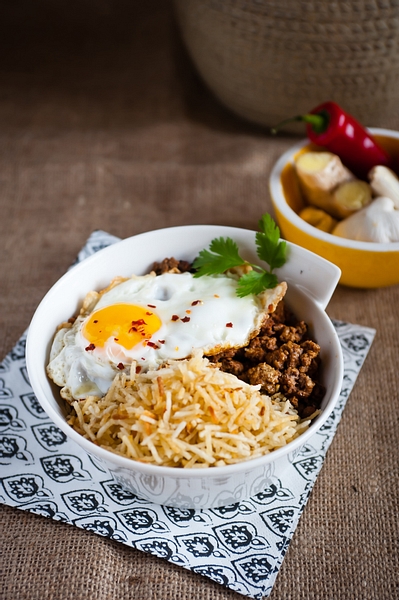
My mum was always pushing me toward excellence, and she is a perfectionist by nature. She has exact recipes and everything has to always be precise. Another mentor I am grateful for is my father's sister Villie fui. She shared her in-depth knowledge, encouraged me to cook with my mind's palate, taught me to create from leftovers rather than to discard them. At 88, she still cooks and bakes from memory, refusing to ever keep a diary or journal. With three very loving yet extreme influences, I have learnt to draw from the best of them.
All this aside, while I enjoy cooking from my own heart and at will, it would have been impossible and impractical to write a cookbook or a food blog without learning the art of precise measurement!
JBW: Niloufer, thanks for speaking with AHE once again, and we wish you much success inside and outside of the kitchen!
NM: Thank you for inviting me to share my views, James. It has been a pleasure.
Readers can access AHE's earlier interview with Niloufer Mavalvala on The Art of Parsi Cooking here: http://etc.ancient.eu/interviews/ancient-indian-flavors/
Born and raised in Karachi, with London, Toronto, and Dubai also very much a part of her life, Niloufer Mavalvala started to bake when she was eight years old and taught her first solo class at 17. Nonwithstanding a love of travel, it is culture through its cuisine informs Niloufer's passion in the kitchen. Niloufer organizes frequent cooking demonstrations and classes at her home in Canada. Over the years, she has gone on to teach many more cooking classes all over the world, including at Le Cordon Bleu in London. In 2013 CE, Niloufer decided to start a simple recipe blog – Niloufer's Kitchen – in which she shares old and new culinary creations to over half a million visitors from around the world. Author of 10 e-cookbooks, she has also hosted a TV-show on Parsi cooking in the USA. She is currently pursuing food photography and continues to write and create recipes for an assortment of international magazines and journals. She is the author of The Art of Parsi Cooking: Reviving an Ancient Cuisine and The World of Parsi Cooking: Food Across Borders both of which are available on Amazon.

